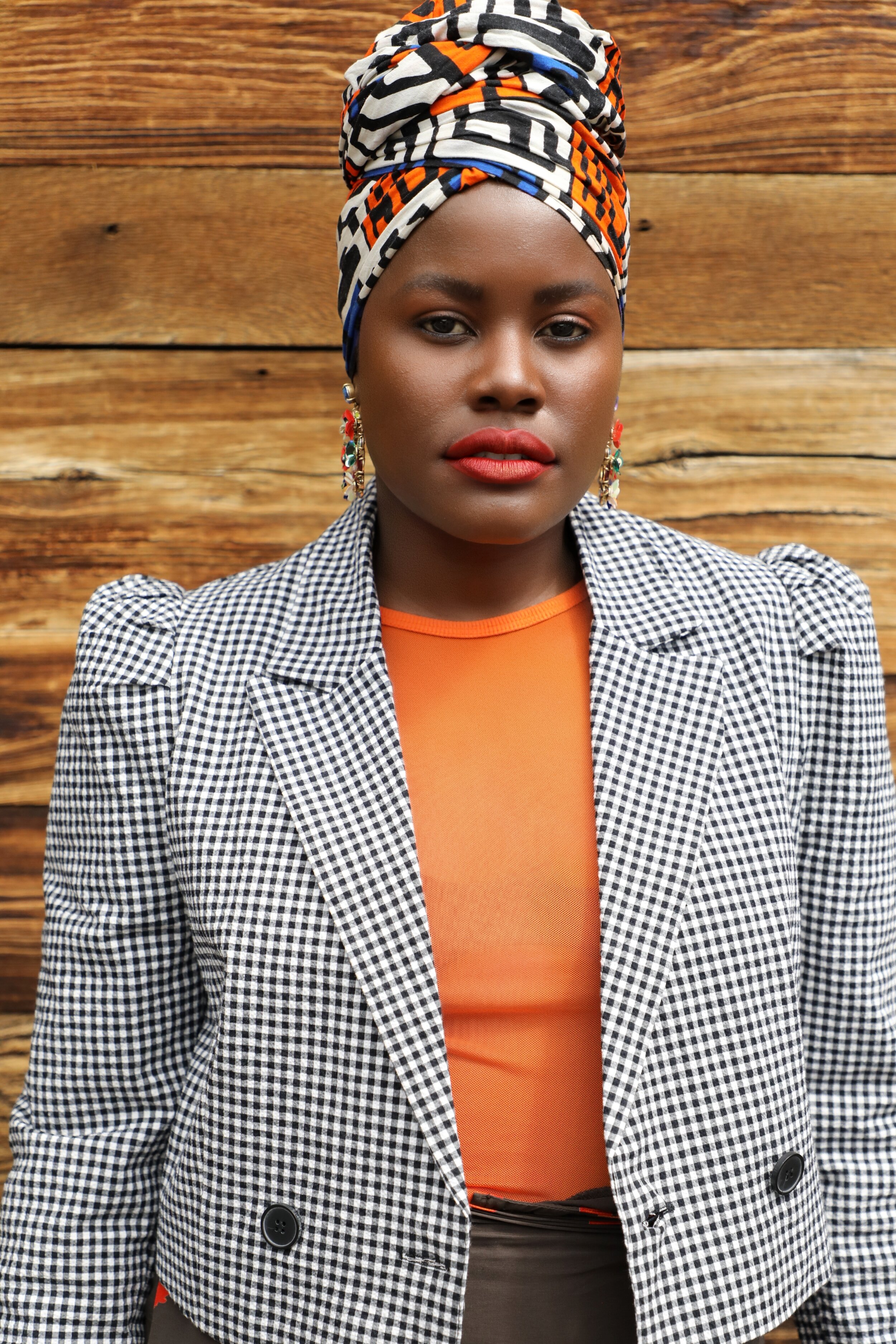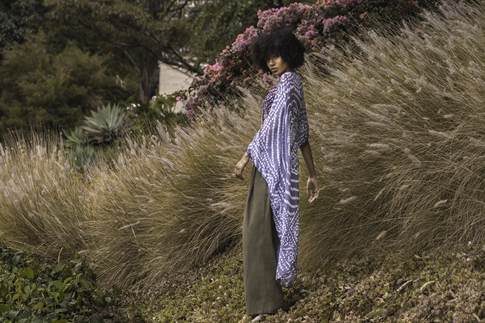Fashion PR & African Brands Rep Koya Nyangi's Favorite African Designers for Fall
In this month’s talk shop, Editor in Chief ESTHER LEE LEACH interviews Fashion PR & African Brands Rep Koya Nyangi about her love of African designers. Born in Kenya, Nyangi wants to ‘change the way the world sees African Fashion. She was photographed on Detroit Street in Cherry Creek.
PHOTOGRAPHED BY ESTHER LEE LEACH // MAKEUP BY CARYN PINE
Esther Lee Leach: How did you get involved in the fashion industry?
Koya Nyangi: My involvement in the fashion industry started in Kenya, further transitioning from the different places in the world I have lived. I have always been fascinated by how people compose an outfit, embracing the different pieces, and owning their individuality. When I moved to Denver, I immersed myself into the fashion scene through a campaign that began my journey here in the US. The ‘100 Days of Denver Fashion’ documented and blended my style with the Denver scene, paving my current path in the industry.
ELL: Tell us more about your career so far?
KN: My career in fashion has grown organically with every strategic move I have made since arriving in the US. I feel blessed to be given this opportunity to do what brings me joy, purpose, and allows me to fuel my creativity. I started my fashion journey working as an editorial stylist on fashion campaigns, with magazines and brands. As a writer, I have had my work published in multiple fashion magazines and I have been lucky to participate as a speaker on panels discussing style.
ELL: You have always been a champion of designers from the African continent. Why is this important to you?
KN: As a Kenyan native my unique perspective allows me to frame the conversation around African fashion through a uniquely global lens and so when I post on my platform, “Get to know the African Designer” I mention the country and I talk about their distinctive designs. This is meant to show the unique and different styles of my homeland, to show the world that African designs are fresh, trendy, colorful and should be measured within the same standards of other international designs. There is a need for me to showcase what African fashion brings to the world, from a continent of 54 countries each with a unique point of view, different culture, heritage, craftsmanship, and textile. I want to educate on the many looks and styles the continent has to offer and show that diversity can be better represented in the global fashion industry.
Most importantly, I want consumers to understand the significance of buying and consuming African fashion, the impact on the continent at large, and to the communities that the designers work with. Fashion has the potential to create hundreds of thousands of jobs on a continent where the unemployment rate is staggering. Empowering local artisans through training, enabling the tailors they hire to professionalize their craft, creating a platform that allows for stable incomes to take care of their families and getting people out of poverty. My work in showcasing African fashion serves as a tool to help further the agenda.
ELL: You are now working on a new business venture that will introduce these designers to boutiques in Denver and the rest of the US. Tell us more about this.
KN: Yes, I am on an exciting and fulfilling journey as an advocate of African fashion, looking to put a spotlight on brands from Africa. This new venture sees me as an independent fashion PR and international sales representative for African fashion brands and designers. I will work as an intermediary to facilitate positive and rewarding wholesale business relationships between African brands and retailers.
My new role allows me to bring African fashion from regions that you may love but, as boutique owners, having no way of accessing it. As a representative for African brands, I allow boutiques to discover and to carry African lines as they strive to be more inclusive with global opportunities.
A boutique owner in Denver who is looking to expand their lines with African fashion, the question they ask themselves is where is the starting point? How do I find and connect with them? Where is a resource for me to select brands that fit into the aesthetic of my boutique? By working with my company, I identify and match you with the right brand that fits your style. I take away the hustle that comes with bringing in a new line from a place you are curious about but are unfamiliar, scouting the continent to create an accessible pool of brands for you to choose from.
My hope is that when consumers walk into their favorite boutiques looking for cool African brands to purchase, they know it’s accessible. Partnering with boutiques to help support diverse talent, allowing for emerging brands from Africa to penetrate a bigger and more seamless part of the overall fashion narrative, while offering boutiques a competitive advantage.
KOYA’S TOP AFRICAN DESIGNER BRANDS FOR FALL
Adele Dejak // If you consider yourself sophisticated, edgy, trendy, and fashionable, Adele Dejak is the brand for you. Born in Nigeria and now based in Nairobi, her namesake jewelry brand draws inspiration from a variety of African cultural influences. The cutting-edge pieces fit perfectly between artifact and high fashion statement designs. Each piece is expertly handcrafted out of recycled materials, with her statement-making aesthetic extending to daring neckpieces and elegant earrings with sculptural silhouettes.
Kiko Romeo // Kiko Romeo, meaning “Adam’s Apple” in Kiswahili, is co-designed by mother-daughter duo Ann and Iona McCreath from Nairobi, Kenya. The heritage lifestyle brand was founded in 1996 to stimulate employment through trade and to encourage appreciation of traditional crafts. Kiko Romeo has been igniting the Kenyan fashion scene since 1996., the label offers sustainable, contemporary designs crafted by local artisans using traditional hand-dyeing techniques. At the heart of the brand is a nod to Kenyan culture, which can be noted in the brand’s quirky details that pay tribute to the country’s art and music scene.
Ami Doshi Shah // With a passion for nature, designer Ami Doshi Shah utilizes locally sourced materials, offcuts and remnants of the Kenyan mining industry to create sculptural pieces and wearable art. Trained as a jeweler and silversmith in the U.K., she was drawn back to her native country and launched her namesake label twelve years after graduating from university. Her pieces can be characterized by their unexpected, sculptural designs and spellbinding natural materials. Juxtaposing materials in unexpected ways underlines her design ethos.
Lilabare // Kenyan-based fashion brand Lilabare was created in 2017 with a vision to create comfortable clothing and jewelry that is sustainable in every aspect. Lilabare’s ethos is to create unique clothing and jewelry that benefit both the makers and the wearers of their pieces. The majority of fabrics Lilabare use is selected from post-manufacturing waste materials. Jersey fabrics are made in Kenya and dyed in neutral colors to reduce its water footprint. The few materials that are not handcraft or recycled are sourced from women-owned artisanal units. Lilabare avoids using any heavy-duty and therefore heavy-pollutant machinery. Every button, pendant, and bead is created through a process of up-cycling metal sourced from old machinery, locks, and other high-quality metal detritus. All of Lilabare’s jewelry pieces are handcrafted. Semi-precious stones are ethically mined, extracted in small blasts that allow the rock to regenerate. All of Lilabare’s artisans, farmers, boomers, weaver, and tailors are paid above average for their work. Lilabare’s goal is to be 100% natural & handcrafted.
Koya Nyangi: @letmeshowyoudifferent // Letmeshowyoudifferent.com
Makeup: @carynpine












